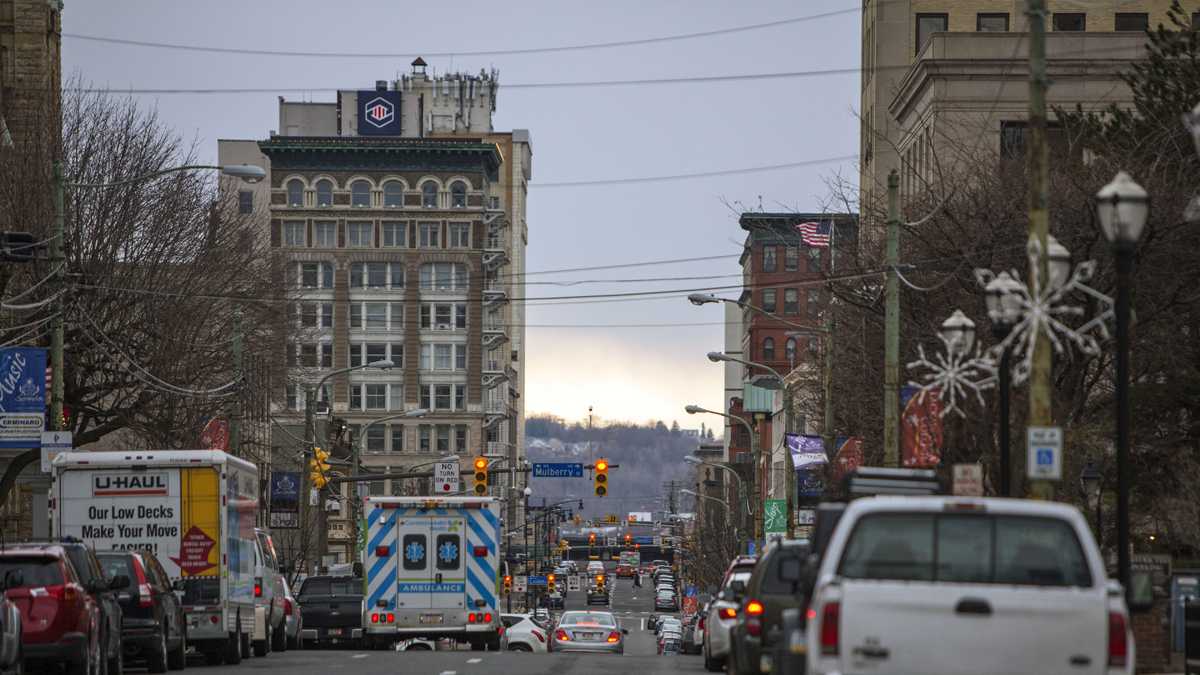Scranton settles on payment terms for 2011 union judgement

An ambulance drives in downtown Scranton.
The city negotiated lower interest rates and pension reform.
On Friday, Scranton Mayor Bill Courtright announced that a settlement had been reached between the city and the police and fire unions over back pay. The settlement will likely help the city avoid bankruptcy or interruptions to their Act 47 (the state’s program to assist distressed cities) recovery plan.
Scranton will pay just under $30 million to active police officers and firefighters, as well as retirees affected by the lost pay. By negotiating a settlement out of court, the city was able to get the unions to agree to pension reform and interest caps. Scranton has until June 30th to secure financing for the payment.
In a statement released Friday, Courtright said, “a liability amounting to more than a quarter of our city’s budget is finally off our back…we did it by fighting hard for concessions, standing firm with the banks to demand a fair interest rate, and ensuring real, game-changing pension reforms as an absolute, non-negotiable condition.”
How did this happen?
In 2002, as part of Scranton’s Act 47 recovery plan, the city capped raises and withheld longevity pay for police officers and firefighters. The unions said that violated collective bargaining agreements. The city argued that the Act 47 recovery plan trumped those agreements.
Nearly a decade later, the state Supreme Court ruled in favor of the unions and ordered the city to pay police officers and firefighters affected by the wage freezes. Then-mayor Chris Doherty struck a deal with the unions to pay $16 million to active duty officers and nearly $8 million to retirees.
As interest added on at about $100,000 a month, according to the current mayor’s office, the settlement went unpaid. As Doherty told Bloomberg Business in 2012, “I don’t have the money. There’s no financial institution that’s going to give me $30 million to pay it.”
Since the missed payment deadline of June 30th, 2013, approximately $3.7 million of interest has accrued. When Mayor Courtright was elected in 2013, this judgement was identified as one of three major problems the city had to fix to avoid bankruptcy or receivership, along with a roughly $50 million parking authority debt and the underfunded pension system.
After more than two years of negotiations between the unions and the city, the Courtright administration has reached an agreement that helps solve, at least partially, two of those three issues. And it may end up helping with a third as well.
Settlement details
The city will pay nearly $30 million of back pay to firefighters and police officers. But rather than paying five years of interest at 6 percent, the interest accrued since Courtright took office will be calculated at 3 percent. Interest will not be paid to retirees, saving the city an expected $3.6 million.
The money saved from the interest rate decrease will be reinvested into the police and fire pension funds. About $800,000 will be deposited into each fund in an effort to shore up the severely distressed funds.
Also as part of the settlement, the city and the unions negotiated pension reforms. Scranton has one of the most distressed pension funds in Pennsylvania. The city has the highest rate of people receiving disability pensions in the state, and there have been allegations of misconduct leading to people receiving double pensions.
Going forward, the pension funds will be managed by a third party, rather than the local pension boards. The city will be issuing a Request for Proposals to find a suitable organization to run the fund. Disability pensions will be administered through a single, independent physician. And recent reforms to the firefighters contract will be added to the police contract as well.
The city is currently negotiating a multi-year debt service package that will help finance the settlement. The details are not finalized, but they are expecting a 20-year payment plan. Scranton may try to wrap the $50 million parking authority debt into this bond issue in an effort to pay down the two debts simultaneously.
“We very likely are going to have a concurrent process here of refunding parking authority debt as we work on issuance of debt to fund the award settlement,” said David Bulzoni, the city business administrator. “Some of that is based on existing funding the city has in our workers compensation reserve account, which is in excess of the actuarial requirement.”
The city is hoping the bond will have sub-six percent interest.
If the city had not struck this deal, the court would have enforced judgement. The city would have lost the pension reforms and interest rate decreases negotiated by the unions and the mayor. And the unions were prepared to act to get the money they were owed.
“[Scranton is] hopefully in the process of closing a deal to sell the sewer authority, which will give the city net proceeds to help take care of our distressed pension funds, potentially,” said Ned Abrahemsen, labor counsel for the city. “The union was prepared, if we did not reach a settlement, to levy on those proceeds to pay upfront, which would not have been in our best interest.”
City Council will vote on the agreement twice in the next two weeks, and if it is approved, the city can begin finalizing the bond issue. Courtright is confident that the council will vote yes, and “if not, I hope they have a resolution better than ours.”
WHYY is your source for fact-based, in-depth journalism and information. As a nonprofit organization, we rely on financial support from readers like you. Please give today.



